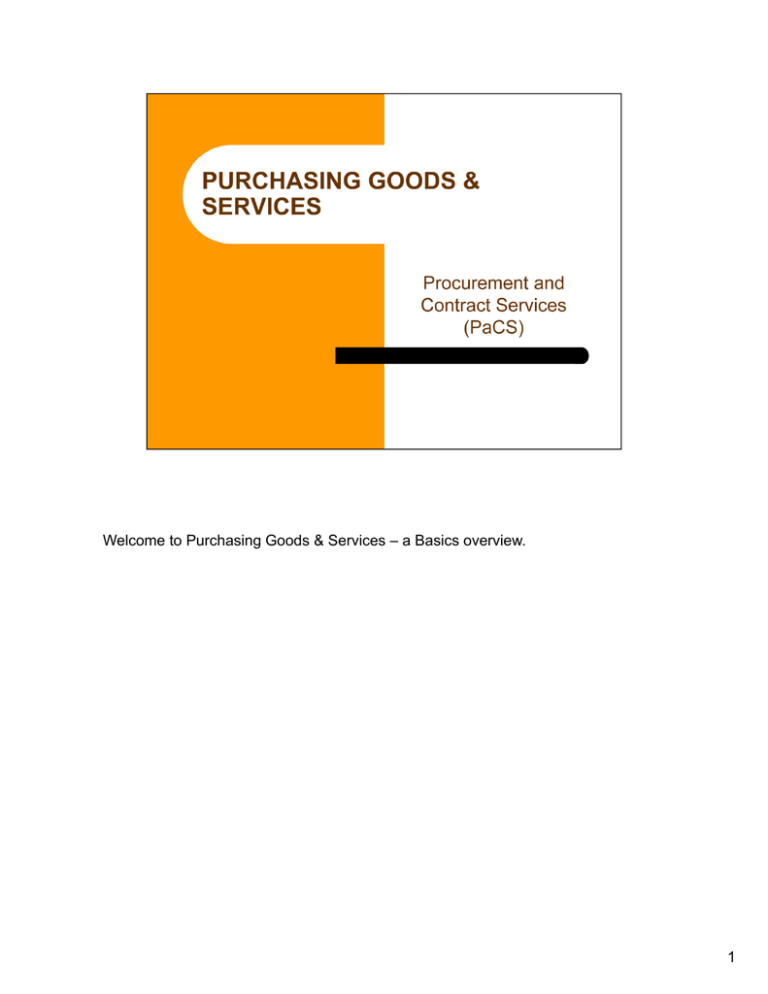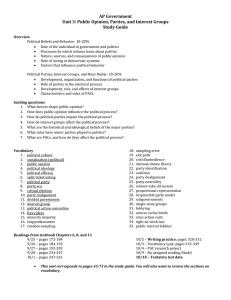Welcome to Purchasing Goods & Services – a Basics overview. 1
advertisement

Welcome to Purchasing Goods & Services – a Basics overview. 1 Today we will discuss the following: • Purchasing & Contract Ethics • Delegated Purchasing Authority • BOLI Prevailing Wage Rates • Types of Solicitations • Buy Orange • Contract Signature Authority • PaCS Contracts • PaCS Resources 2 • At the link noted there are new PaCS procedures and section 100 covers the following topics and you should become familiar with review them: • 101 – Employee ethical conduct 103 – Ethics in Purchasing & Contracting • 102 – Interaction w/vendors 104 – Conflict of Interest. • It is critical to remember with all your work #1 - OSU employees are expected to uphold the highest ethical standards in their relationships with one another, with students, with the wider community and in all of their professional actions. #2 - Employment at OSU is a public trust. Employees responsible for maintaining the integrity of the competitive, procurement and contracting processes and we act as stewards of the University and taxpayers’ dollars so we need to avoid even the perception of a conflict of interest. • At the second link above you will find the Oregon University System (OUS) “Code of Ethics”. The Code of Ethics states that on an annual basis OUS employees will sign a statement that they have reviewed and will comply with OAR 580. Anyone responsible for procuring or contracting for goods and services should complete this Ethics Statement. Here OUS supplies the online tool for you to complete this process. • We often hear of things such as “my brother works for company ABC but they are the lowest cost supplier of this product”. Please review the conflict of interest section at this OUS web page. After you review the policies if you have any questions or clarifications contact PaCS and we can discuss them. 3 • Under $5000 Department Direct Purchase • $5000 - $24,999 Your purchases must be submitted to your Business Center. Follow your Business Centers rules for purchases within this dollar range. • $25,000 and up to comply with state statutes PaCS must competitively solicit and advertise every one. If you have received a quote for information etc. remember that we will have to requote with the same company when we do the “official” solicitations. You will need to fill out a purchase requisition, insure it is signed then submit it with your additional information i.e. a scope of work to your Business Center. The BC will process for the required financial authorization signature and forward the whole package to PaCS • The exception at all spending levels is that any purchase that involves BOLI/prevailing wage rates, even below $5,000, will have to be sent through the BC to PaCS. The next several slides will cover this topic. 4 • BOLI = Bureau of Labor and Industries sets base trade services wage rates by geographic area which are known as prevailing wage rates. • Don’t let the cost idea grow out of proportion. Many contractor’s pay at the Prevailing Wage Rate already and the fee’s associated with BOLI and bonding are related to the total value of the project. Plus on some of the basic bonding requirements the Bureau waves the requirement for emerging small businesses. • The key is to pass the project by the PaCS construction team before going ahead with any purchase so they can handle the purchase if the Prevailing Wage Rates apply. 5 A couple things are keys to evaluating if a project involves BOLI/PWR issues at all. • One key is the cost – If either the cost of the individual project or the total costs from projects over the last rolling 12 months is $50,000 for your building. Then you will be operating under the BOLI/PWR regulations. For the experiment and extension centers they consider the whole site location rather than individual buildings to be one cost center for this evaluation. • The other key is really defining what is a BOLI project and that is just as noted on this slide – “Construction, reconstruction, renovation, or repair on a building. and sometimes even installation, assembly or setup of equipment in a building.” 6 As an example let us say your department wants to add a bit of landscaping to the front of the building and the estimate is $2,100. In looking at what has been done in the building you remember that you had a painting project in one office area for $1,500 and a carpeting project in another area for $2,400 so the total expenses you remember are $6,200 in the last 6 months. But knowing the project fits the description of a BOLI/PWR project you know you should also check with PaCS. 7 When you check with PaCS you learn that another department has updated a basement lab about 8 months ago at a cost of $150,000. 8 So from the perspective of the Bureau of Labor and Industries the public improvement costs on the building in the last rolling 12 month period will be $156,200 when this project is completed. The project will need to go to PaCS and be handled under the BOLI/PWR guidelines. 9 • RFQ – is a Request for Quotations. An RFQ is issued for purchases below $100,000. Specifications must be clear and precise. Award is made to the lowest quoter meeting all of the specifications identified in the RFQ. • ITB – is an Invitation to Bid. An ITB is issued for purchases above $100,000. Specifications must be clear and precise. Award is made to the lowest bidder meeting all of the specifications identified in the ITB. Requires formal procedures which differ from an RFQ such as receipt of Bids in Sealed Envelopes, Public Openings and a 7 day Protest Period. • RFQs & ITBs are typically used for purchase of goods. • IRFP – is an Informal Request for Proposal. An IRFP is issued for purchase of goods or services below $100,000. Award is made based on the evaluative criteria specified in the IRFP which include factors beyond price. Because of the evaluation factors, this process typically takes longer than an RFQ or ITB. • RFP – is a Request for Proposals. An RFP is issued for purchase of goods or services above $100,000. Award is made based on the evaluative criteria specified in the RFP which include factors beyond price. Because of the evaluation factors, this process typically takes longer than an RFQ or ITB. Requires formal procedures which differ from an IRFP such as receipt of Proposals in Sealed Envelopes, Public Openings and a 7 day Protest Period. • RFPs and IRFPs are typically used for services, or for goods with a substantial service component. • Sole Source - Sole Sources valued at $25,000 or higher are only allowed when it can be thoroughly documented that the Vendor holds a unique (no other sources have it) set of skills or expertise that make it impossible for anyone else to do the Work or that the goods are not available from another source. SOLE SOURCE IS NOT A TIME SAVER! PaCS must review and determine if it is a valid sole source, and this can take time. If it is determined to be valid, the Sole Source Request must then be advertised on the OUS website for 7 days. 10 BUY ORANGE is the PaCS portal to established OSU Contracts and Price Agreements. Purchases within your delegated authority may be made directly against these contracts, unless BOLI Prevailing Wage Rates apply. Purchases $25,000 and over still need to be sent to PaCS through the Business Center, but competition will not be required when using one of these contracts. Another advantage to using these contracts is that terms and conditions have already been negotiated. Let’s take a look at some specific sections of Buy Orange that may be of note. Click this button: A Qualified Rehabilitation Facility, or QRF, is a non-profit organization that puts Oregonians with disabilities to work. 11 As a State of Oregon agency, OSU does business with QRFs because: It is the right thing to do, providing business opportunities for the disabled. It is the smart thing to do, assisting the disabled earn a working wage. It puts you in the driver's seat with the ability to negotiate contracts tailored to exactly the product/service you want. It is the necessary thing to do according to the 1977 "Products of Disabled Individuals" act that obliges tax supported political bodies in Oregon to purchase goods and services from QRF's when products meet the agencies requirements. Links to a number of QRFs can be found at the bottom of the page. You may also find a link to the State of Oregon QRF Organizations page which allows you to search for available QRFs in a number of ways. You can return to the Buy Orange page by clicking this button on the left: Next let’s take a look at the State of Oregon Contracts. Click this button: On this page you will find a link to the listing of available State of Oregon Contracts. Price Agreements placed by either the State of Oregon allow you to purchase products within your authority without going through a competitive process. Let’s go back to the Buy Orange page again. Many of the price agreements negotiated by PaCS contain a contract summary to provide quick access to important contract information. Let’s take a look at the Dell Contract Summary under “Computers” as an example. Click this button: This page gives a summary of the Buy Orange program for computers as well as links to the OSU Store at the website of each participating vendor. Contract Summaries can be found at the bottom of the page. Click Dell Contracts This opens a pdf with the contract summary. Here you can find details on how to use the contract, vendor contact information, contract end dates and other information. At the bottom under “Questions” you will find contact information for the analyst who manages this contract. 12 13 Only delegated Institution Contract Officers are allowed to sign contracts. If a PO within your delegated authority requires a contract or lease to be signed, you should send the contract or lease to PaCS BEFORE issuing the PO. Equipment Leases – The Commodity Lease Intake Form is now required for all acquisitions of goods or commodities through a lease. You can find this form on the PaCS website under resources. There is an exception. Agreements between OSU departments do not require a signature by an Institution Contract Officer. 14 This slide shows some typical examples of contracts that are under PaCS purview. Also shown on the right are examples of contracts that are handled by other OSU departments. 15 The PaCS website contains a number of useful resources. Including: • NEWS FEED - The news feed is found at the bottom of the main page, and is one tool that PaCS uses to communicate to the OSU community. Check here for important updates. • Clicking on Business Centers from the left hand menu of the main page will bring up links to a number of resources often used by Business Centers. These include: • Timelines for Processing • Checking the Status of Your Project at PACS • You may also use the Projects & Solicitations link at the top of page to Check Project Status. • Clicking Forms at the top will take you to a page with links to many of the forms you may need, including requisitions and PSC templates. • Clicking Resources at the top, then Reference Materials will open a page with a number of resources, including: • PaCS Policies & Procedures • PaCS Essentials • Authorized Contract Signatories Letter • OAR / ORS • You may also give PaCS a call at the number shown here if you have any questions or email pacs@oregonstate.edu Many people monitor this e-mail. You should send any questions or new projects here first. 16 Do you have any questions? 17



